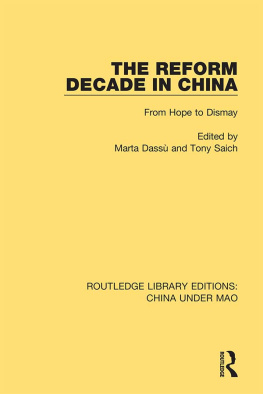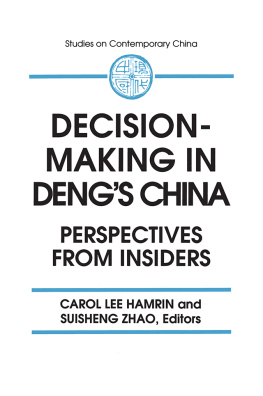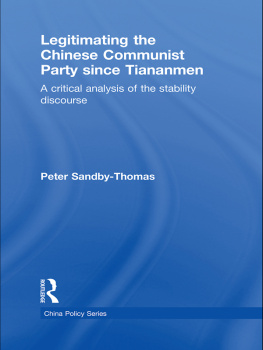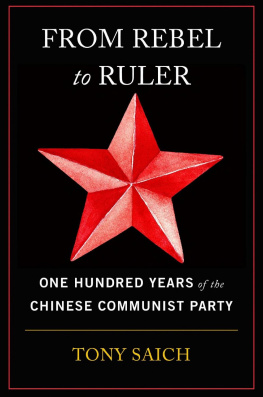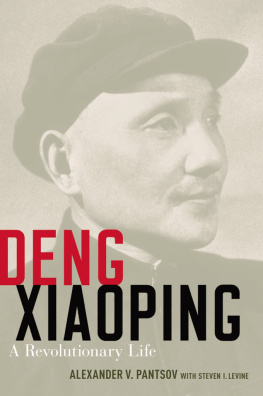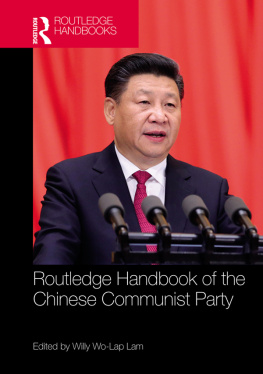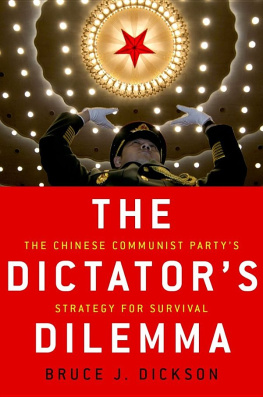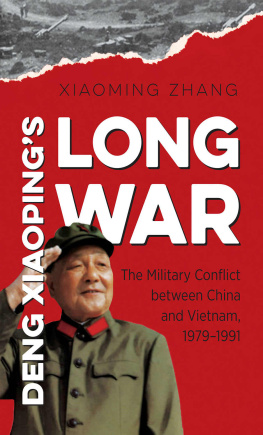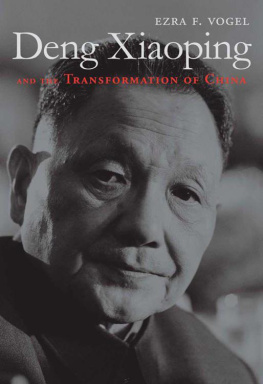Politics of Disillusionment
Studies on Contemporary China
THE POLITICAL ECONOMY OF CHINAS SPECIAL ECONOMIC ZONES
George T. Crane
WORLDS APART
RECENT CHINESE WRITING AND ITS AUDIENCES
Howard Goldblatt, editor
CHINESE URBAN REFORM
WHAT MODEL NOW?
R. Yin-Wang Kwok, William L. Parish, and Anthony Gar-On Yeh with Xu Xueqiang, editors
REBELLION AND FACTIONALISM IN A CHINESE PROVINCE
ZHEJIANG, 19661976
Keith Forster
POLITICS AT MAOS COURT
GAO GANG AND PARTY FACTIONALISM IN THE EARLY 1950s
Frederick C. Teiwes
MOLDING THE MEDIUM
THE CHINESE COMMUNIST PARTY AND THE LIBERATION DAILY
Patricia Stranahan
THE MAKING OF A SINO-MARXIST WORLD VIEW
PERCEPTIONS AND INTERPRETATIONS OF WORLD HISTORY
IN THE PEOPLES REPUBLIC OF CHINA
Dorothea A. L. Martin
POLITICS OF DISILLUSIONMENT
THE CHINESE COMMUNIST PARTY UNDER DENG XIAOPING, 19781989
Hsi-sheng Chi
An East Gate Book
First published 1991 by M.E. Sharpe
Published 2015 by Routledge
2 Park Square, Milton Park, Abingdon, Oxon OX14 4RN
711 Third Avenue, New York, NY 10017, USA
Routledge is an imprint of the Taylor & Francis Group, an informa business
Copyright 1991 Taylor & Francis. All rights reserved.
No part of this book may be reprinted or reproduced or utilised in any form or by any electronic, mechanical, or other means, now known or hereafter invented, including photocopying and recording, or in any information storage or retrieval system, without permission in writing from the publishers.
Notices
No responsibility is assumed by the publisher for any injury and/or damage to persons or property as a matter of products liability, negligence or otherwise, or from any use of operation of any methods, products, instructions or ide as contained in the material herein.
Practitioners and researchers must always rely on their own experience and knowledge in evaluating and using any information, methods, compounds, or experiments described herein. In using such information or methods they should be mindful of their own safety and the safety of others, including parties for whom they have a professional responsibility.
Product or corporate names may be trademarks or registered trademarks, and are used only for identification and explanation without intent to infringe.
Library of Congress Cataloging-in-Publication Data
Chi, Hsi-Sheng.
Politics of disillusionment : the Chinese Communist Party under
Deng Xiaoping, 19781989 / by Hsi-Sheng Chi.
p.cm. (Studies on contemporary China)
Includes bibliographical references and index.
ISBN 087332-689-X (C). ISBN 087332-6903 (P)
1. Chung-kuo kung chan tang. 2. Teng, Hsiao-ping, 1904
3. ChinaPolitics and government1976- I. Title. I. Series.
JQ1519.A5C475356 1991
324.25107509048dc20
9020867
CIP
ISBN 13: 9780873326902 (pbk)
To Bridie and Bernard
T HE C HINESE Communist Party (CCP) has experienced phenomenal growth in the last forty years. When it first came to power in 1949, it had only about 4.5 million members. By early 1989, the party had 48.3 million members, and nearly 3 million basic-level organs.
The partys presence in Chinese society has become more visible during the past forty years. In 1949, there was one party member for every one hundred Chinese. By late 1980s, there was one party member for about every twenty Chinese. If the ratio between party members and the adult population is measured, then the partys presence is even stronger.
As is true with many things pertaining to China, scale is an important consideration. The CCP has the distinction of being not only the largest Communist Party in the world, but also the largest political party of any kind in the world. The Chinese party has more members than all other Communist parties combined, and its membership is larger than the population of more than three-fourths of the countries in the world. Such sheer magnitude commands attention in its own right.
But a far more important reason for studying the CCP is that it is indispensable to any understanding of politics in China. The Marxist-Leninist ideology bestows upon the party the special status as the vanguard of the revolution. As Chinese Communists are proud to claim, Communists are made of special materials. They are supposed to be ideologically committed, politically active, and progressive. They are armed with scientific knowledge on how to build a good society, and their personal conduct is supposed to serve as the model for ordinary people. They are imbued with a strong dedication to serve the people, to be the first ones to endure hardship but the last ones to enjoy life. It is these superior qualities that entitle members of the Communist Party to occupy a supreme position in all aspects of Chinese life.
Historically, Chinese Communists have always put strong emphasis on the partys own development. Even during the years of protracted armed struggle against the Japanese and the Nationalists, Mao Zedong insisted on the principle that the party must command the guns and not vice versa. The CCPs military successes became impressive only after enormous effort had been made to reorganize and unify the party (194245). After Liberation in 1949, the partys role was greatly expanded in its capacity as Chinas ruling party. As students of PRC politics know well, whereas the state has provided the muscle in the Chinese political system during the past forty years, the party has actually been its soul. Broadly speaking, the party has had to perform two major functions: to rule and control several hundred million people, ensuring the survival of the regime without heavy reliance on the secret police or the military; and to run the government, provide essential services, and carry out the task of socialist construction. To perform the former function, the party needs strong organizational sinews and good discipline among its members, whereas to perform the latter, it needs expertise in management and development.
During the past several decades, a generation of meticulous and insightful scholars has produced a rich body of literature in the English language concerning many critical aspects of the politics in the Peoples Republic. These scholars have taken different approaches to deciphering the secret of Chinese politics. Some have chosen political leaders (Mao Zedong, Zhou Enlai, Liu Shaoqi, Deng Xiaoping, etc.) as the subjects of their investigation. Others have looked critically at the nuances in Chinese interpretations of the Marxist ideology or Mao Zedongs Thought. Still others have examined various branches of the bureaucracy (including the Peoples Liberation Army) or specific public policies. Political campaigns (such as the Great Leap Forward or the Cultural Revolution), factional activities (as within the Politburo), and purges (the Gao Gang-Rao Shushi affair, the dismissal of Peng Dehuai, the Lin Biao affair) have also received great attention. To the extent that these works deal with the party as such, however, most of them tend to focus attention on activities on the elite level.
Thus, although the party is offered as a critical explanatory variable for many important aspects of Chinese political life, relatively little effort has been made to date to delve beneath the leadership level and examine in detail the partys organizational and behavioral characteristics on the rank-and-file level. In short, the party as a political organization has remained largely a black box.


